英语Unit4
高一英语(牛津)-Unit4-知识点梳理
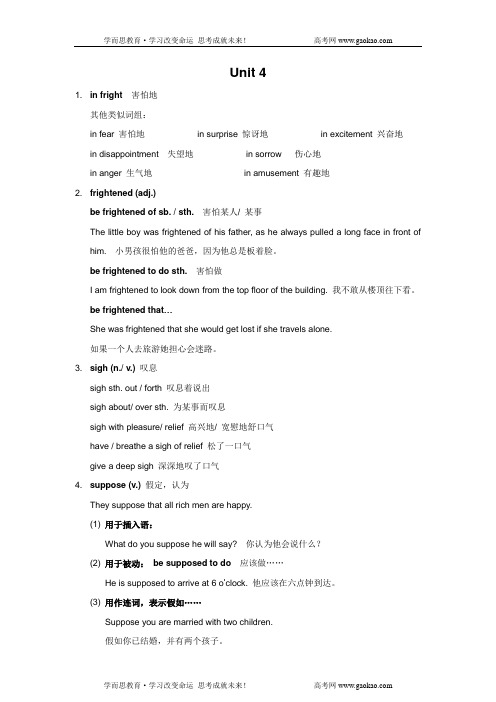
Unit 41. in fright 害怕地其他类似词组:in fear 害怕地in surprise 惊讶地in excitement 兴奋地in disappointment 失望地in sorrow 伤心地in anger 生气地in amusement 有趣地2. frightened(adj.)be frightened of sb. / sth.害怕某人/ 某事The little boy was frightened of his father, as he always pulled a long face in front of him. 小男孩很怕他的爸爸,因为他总是板着脸。
be frightened to do sth. 害怕做I am frightened to look down from the top floor of the building. 我不敢从楼顶往下看。
be frightened that…She was frightened that she would get lost if she travels alone.如果一个人去旅游她担心会迷路。
3. sigh (n./ v.) 叹息sigh sth. out / forth 叹息着说出sigh about/ over sth. 为某事而叹息sigh with pleasure/ relief 高兴地/ 宽慰地舒口气have / breathe a sigh of relief 松了一口气give a deep sigh 深深地叹了口气4. suppose (v.) 假定,认为They suppose that all rich men are happy.(1) 用于插入语:What do you suppose he will say? 你认为他会说什么?(2) 用于被动:be supposed to do 应该做……He is supposed to arrive at 6 o’clock. 他应该在六点钟到达。
牛津小学英语4A Unit4单词(含音标及例句)

牛津小学英语4A Unit4单词(含音标和例句)汇总Unit4 I like ...单词数:271.balloon /bəˈlu:n/n. 气球例句:1.He bought a balloon for his sister.他给他的妹妹买了一个气球。
2.bike /baɪk/n. 自行车例句:1.How do you go to school everyday, by bike or by bus?你每天怎么上学,是骑自行车还是乘坐公共汽车?2.His father bought a new bike for him.他父亲给他买了一辆新的自行车。
3.brown /braʊn/n. 褐色,棕色 a. 褐色的,棕色的例句:1.Have you got any brown paper?你有棕色的纸吗?4.bus /bʌs/n. 公共汽车例句:1."How do you go to school?" "I go to school by bus."“你怎么去学校?”“我坐公交车去学校。
”5.car /kɑ:/n. 汽车;小汽车;小卧车例句:1.Mr. Brown has a very nice car.布朗先生有一辆非常棒的小汽车。
6.clean /kli:n/vt. 弄干净,擦干净(过去式cleaned)a. 清洁的,干净的例句:1."What's she doing?" "She's cleaning her room."“她在做什么?”“她正在打扫房间。
”2.Please clean the blackboard.请把黑板擦干净。
7.colour /ˈkʌlə/n. 颜色vt. 给……着色,涂色例句:1.The boy is colouring the picture in his book.那个男孩正在给书上的图片着色。
《Unit4课文原文与翻译学年鲁科版英语(五四学制)四年级上册

鲁科版英语(五四学制)四年级上册课文原文及翻译Unit4英汉对照版Unit 4 SeasonsLesson 1 It's spring.第一课这是春天。
1. Listen and say.听录音并开口说We have four seasons in a year.我们一年中有四个季节。
What season is it?这是什么季节?It's spring.这是春天。
It's spring.这是春天。
It's summer.这是夏天。
It's autumn.这是秋天。
It's winter.这是冬天。
2. Let's talk.说一说What season is it?现在是什么季节?It's spring.是春天。
3.Let’s do.做一做It’s summer. I like summer. It’s winter. I don’t like winter.这是夏天。
我喜欢夏天。
这是冬天。
我不喜欢冬天。
It’s spring. I like spring.It’s autumn. I don’t like autumn.这是春天。
我喜欢春天。
这是秋天。
我不喜欢秋天。
Lesson 2 It's warm in spring.第二课春天很温暖。
1. Listen and say.听录音并开口说It's warm in spring.We often wear sweaters.春天很温暖。
我们常常穿毛衣。
It's hot in summer.We often wear T-shirts.夏天很热。
我们常常穿T恤衫。
It's cool in autumn.We often wear jackets.秋天很凉爽。
我们常常穿夹克衫。
It's cold in winter.We often wear coats.冬天很寒冷。
九年级英语Unit 4 what would you do语法知识点

Unit 4 what would you do?1.What would you do if you had a million dollars? 如果你有一百万美元你会做什么?本句是一个虚拟语气的句子,当if引导的条件状语从句所表达的内容不是事实或者不可能发生的情况,而仅仅是一种愿望、建议,或者是与事实相反的假设时,应用虚拟语气,其构成为:主句:主语+would/could/should/might+动词原形;从句:If+主语+动词过去式(当谓语是be动词时,任何人称都是用were)Eg: 如果我是一只小鸟,我会在天空中自由翱翔。
____________________________________ 如果他有足够的钱的话,他会买辆车。
__________________________________________ 注意:if引导真实条件状语从句时,即表示在假设的条件下,有可能实现的情况,遵循“主将(一般将来时)从现(一般现在时)”原则。
Eg:I'll go home if it doesn't rain tomorrow.如果明天不下雨,我将会回家。
(明天有可能会下雨)()1.—I don’t know if Tom_______these “stay-home children”tomorrow morning. --If I______he,I would come earlier.A.will come to take care of; ame to look after;wereC.will come to take care of;werees to come up with;am( )2.If I_______her, I would sing a song at the party.A.amB.wasC.areD.were( )3.I don’t know if he______here. If he_______tomorrow,I will tell you.A.will come;comeses;will comees;comesD.will come;will come( )4. What would you do if you _______ a million dollars .A. winB. will winC. wonD. wouldlion 名词,意为“百万”,当hundred,thousand,million和billion等词前有数词或相当于数词的词时,这些词不变复数,也不与of连用;如果其前没有数词,既要变复数,也要与of连用,意为“数以……计的”。
2020新译林版高中英语选修第一册unit4课文翻译(英汉对照)

Unit4 Fun with scienceReadingThe human microbiome: an invisible microuniverse人类微生物群系:一个看不见的微宇宙What organisms live with us, make up about two per cent of an adult's body mass, yet are invisible to the naked eye? They are the estimated 39 trillion microorganisms living in and on our body, like bacteria and viruses, which compose the human microbiome!什么生物和我们共生,约占成年人体重的2%,而肉眼却看不见?它们是生活在我们体内和体表的约39万亿个微生物,比如细菌和病毒,它们构成了人类微生物群系!不过没必要恐慌,因为它们大多数都是对健康有益的。
尽管极其微小,这些微生物会以巨大的意想不到的方式影响我们的身心。
But there is no need to panic, for most of them are there to keep us healthy. Even though incredibly small, these microorganisms influence our body and mind in big unexpected ways.So, where do these microorganisms come from? Well, they have always been a part of us. Our very first birthday gift-three quarters of the essential microorganisms we need to survive and grow-is from our mother when we are born. By the time we reach two years old, we have our very own personal collection of microorganisms that reflects the various circumstances of our lives. Going through life, we further expose ourselves to foreign microorganisms, which cause a part of our microbiome to change every day. However, our core set of microorganisms, approximately two thirds, stays fairly constant throughout our lives.那么,这些微生物是从哪里来的呢?其实,他们一直是我们的一部分。
人教高中英语 必修一 unit4Earthquake课文翻译
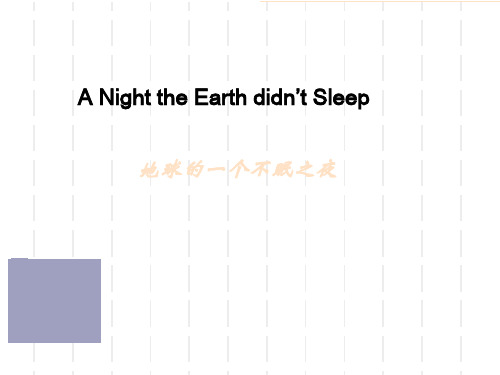
To the north of the city, most of the 10,000 miners were rescued from the coal mines there. 在唐山市的北边,有一个万名矿工的煤矿,其中多数人得救了。
Workers built shelters for survivors whose homes had been destroyed. 援救人员为那些家园被毁的幸存者盖起了避难所,
Half a million pigs and millions of chickens were dead.
50万头猪和几百万只鸡全都死了。 Sand now filled the wells instead of water.
井里满是沙子,而不是水。 People were shocked. 人们惊呆了。
Fresh water was taken to the city by train, truck and plane. 用火车、卡车和飞机向市内运来了水。
Slowly, the city began to breathe again. 慢慢地、慢慢地,这座城市又开始出现了生机。
Then, later that afternoon, another big quake which was almost as strong as the first one shook Tangshan.
接着,在下午晚些时候,又一次和第一次一样的强烈的地震震撼着唐山。
Some of the rescue workers and doctors were trapped under the ruins. 有些医生和救援人员被困在废墟下面。
老鼠从田地里跑出来找地方藏身。
八年级上册英语书unit4单词
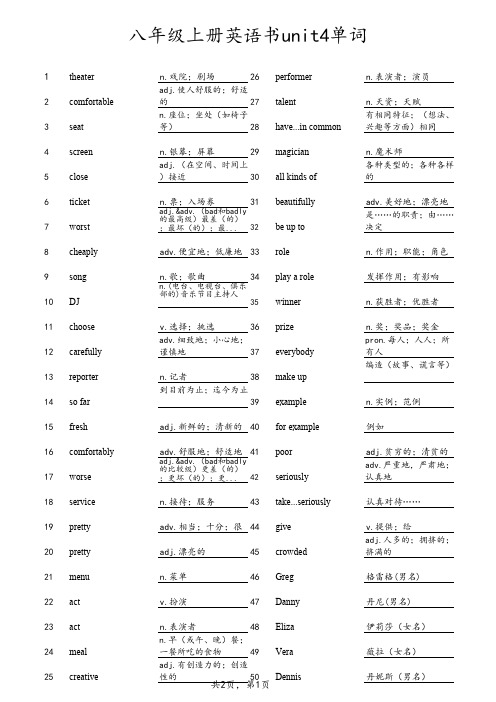
八年级上册英语书unit4单词1theater n.戏院;剧场26performer n.表演者;演员2comfortable adj.使人舒服的;舒适的27talent n.天资;天赋3seat n.座位;坐处(如椅子等)28have...in common有相同特征;(想法、兴趣等方面)相同4screen n.银幕;屏幕29magician n.魔术师5close adj.(在空间、时间上)接近30all kinds of各种类型的;各种各样的6ticket n.票;入场券31beautifully adv.美好地;漂亮地7worst adj.&adv.(bad和badly的最高级)最差(的);最坏(的);最...32be up to是……的职责;由……决定8cheaply adv.便宜地;低廉地33role n.作用;职能;角色9song n.歌;歌曲34play a role发挥作用;有影响10DJ n.(电台、电视台、俱乐部的)音乐节目主持人35winner n.获胜者;优胜者11choose v.选择;挑选36prize n.奖;奖品;奖金12carefully adv.细致地;小心地;谨慎地37everybodypron.每人;人人;所有人13reporter n.记者38make up编造(故事、谎言等)14so far 到目前为止;迄今为止39example n.实例;范例15fresh adj.新鲜的;清新的40for example例如16comfortably adv.舒服地;舒适地41poor adj.贫穷的;清贫的17worse adj.&adv.(bad和badly的比较级)更差(的);更坏(的);更...42seriouslyadv.严重地,严肃地;认真地18service n.接待;服务43take...seriously认真对待……19pretty adv.相当;十分;很44give v.提供;给20pretty adj.漂亮的45crowded adj.人多的;拥挤的;挤满的21menu n.菜单46Greg格雷格(男名) 22act v.扮演47Danny丹尼(男名)23act n.表演者48Eliza伊莉莎(女名)24meal n.早(或午、晚)餐;一餐所吃的食物49Vera薇拉(女名)25creative adj.有创造力的;创造性的50Dennis丹妮斯(男名)共2页,第1页51American Idol 美国偶像(文中为电视节目名称)53China's Got Talent中国达人秀(文中为电视节目名称)52America's Got Talent 美国达人秀(文中为电视节目名称)54共2页,第2页。
Unit 4 单元话题满分范文必背-(牛津译林版)九年级英语上册
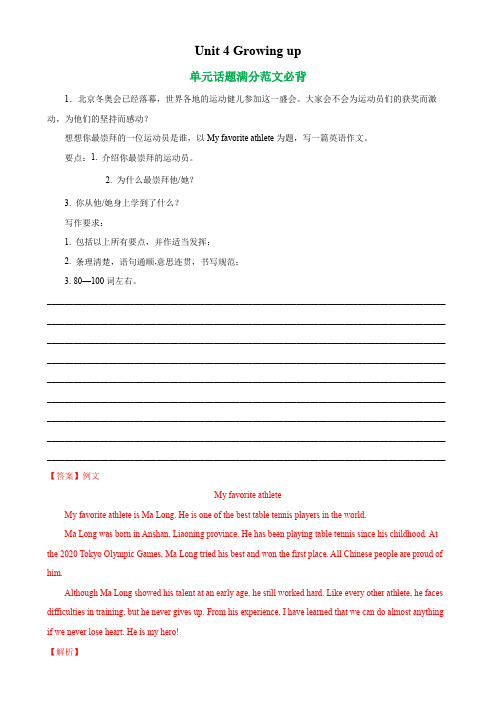
Unit 4 Growing up单元话题满分范文必背1.北京冬奥会已经落幕,世界各地的运动健儿参加这一盛会。
大家会不会为运动员们的获奖而激动,为他们的坚持而感动?想想你最崇拜的一位运动员是谁,以My favorite athlete为题,写一篇英语作文。
要点:1. 介绍你最崇拜的运动员。
2. 为什么最崇拜他/她?3. 你从他/她身上学到了什么?写作要求:1. 包括以上所有要点,并作适当发挥;2. 条理清楚,语句通顺,意思连贯,书写规范;3. 80—100词左右。
___________________________________________________________________________________________ ___________________________________________________________________________________________ ___________________________________________________________________________________________ ___________________________________________________________________________________________ ___________________________________________________________________________________________ ___________________________________________________________________________________________ ___________________________________________________________________________________________ ___________________________________________________________________________________________ ___________________________________________________________________________________________【答案】例文My favorite athleteMy favorite athlete is Ma Long. He is one of the best table tennis players in the world.Ma Long was born in Anshan, Liaoning province. He has been playing table tennis since his childhood. At the 2020 Tokyo Olympic Games, Ma Long tried his best and won the first place. All Chinese people are proud of him.Although Ma Long showed his talent at an early age, he still worked hard. Like every other athlete, he faces difficulties in training, but he never gives up. From his experience, I have learned that we can do almost anything if we never lose heart. He is my hero!【解析】题干解读:题目要求以My favorite athlete为题写一篇英语短文;要求包含所有要点提示。
人教新目标八年级上册英语Unit 4课文翻译

人教新目标八年级上册英语Unit 4课文翻译Unit 4 Section A 1a 部分翻译Language Goal: Discuss preferences; Make comparisons语言目标:讨论喜好;作比较1a How do you choose which movie theater to go to? Write the things in the box under "Important" or "Not Important".1a你如何选择去哪家电影院?把方框中的单词分成“重要的”和“不重要的”两栏。
comfortable seats舒服的座位new movies新电影big screens大屏幕close to home离家近best sound声音效果最好buy tickets quickly快速购票cheap便宜的popular受欢迎的Important重要的Not Important不重要的Unit 4 Section A 2b部分课文翻译Listen again. Write the correct store or radio station next to each statement.再听一遍录音。
在每句话旁边写出正确的商店或电台名称。
Clothes stores服装商场Miller's米勒服装店Dream Clothes梦想服装店Blue Moon蓝月亮服装店It's the most expensive.它最贵。
Unit 4 Section A 2c部分课文翻译Student A,you are the reporter. Student B,you are the boy. Role-play a conversation using the information in 2a and 2b.学生A是记者。
五年级英语上册Unit4 重点句子

五年级英语Unit4 重点句子背诵(30个)努力背过。
1. Nice to meet you. 很高兴遇见你。
2. Did you have a nice trip? 你们旅途愉快吗?3. When will you go to Beijing? 你们什么时候去北京?4. We will arrive in Beijing at 2:00 in the afternoon on February3.我们将要在二月三号的下午两点到达北京。
5. --What do you do for the Spring Festival? 你们为春节做什么?We buy new clothes.我们买新衣服。
We clean our rooms. We clean the doors,the windows and the floor.我们打扫房间。
我们擦门,窗户和地板。
We also make dumplings. 我们也包饺子。
We visit our family and friends. 我们走亲访友。
Kids get lucky money. 孩子们得到压岁钱。
6. I love big dinners. 我爱丰盛的晚餐。
7. What special holidays do you have in China?在中国你们有什么特殊的节日?8. What’s your favourite holiday? 你最喜欢的节日是什么?9. The Spring Festival is coming. 春节要来了。
10. We are going by train. 我们将乘火车去。
11. You will stay two stays with my family for the Spring Festival.春节你们将要和我的家人在一起待两天。
12. We need a camera.我们需要一个相机。
英语书七年级下册u4笔记

英语书七年级下册u4笔记以下是七年级下册英语书U4的笔记,供您参考:Unit 4 Don’t eat in class.重点短语:1. Don’t arrive late for class. 上课不要迟到。
2. Don’t run in the hallways. 不要在走廊上跑。
3. Study in the library. 在图书馆学习。
4. Eat in the cafeteria. 在食堂吃饭。
5. Listen to music in the classroom. 在教室里听音乐。
6. Wear a uniform at school. 在学校穿校服。
7. Go to the back of the line. 排到队伍后面去。
8. The school rules are strict. 学校规定很严格。
9. We have to wear a uniform at school. 我们必须在上学时穿校服。
10. Do you think these rules are fair? 你认为这些规定公平吗?重点句型:1. Do you have to clean the classroom every day? 你每天必须打扫教室吗?2. We can’t arrive late for class. 我们上课不能迟到。
3. We can’t eat in the classroom. 我们不能在教室里吃东西。
4. Can you eat in the cafeteria? 你能在食堂吃饭吗?5. Do you have to wear a uniform at school? 你必须在上学时穿校服吗?6. I think we should be allowed to choose our own clothes. 我认为我们应该被允许选择自己的衣服。
Unit4知识点 人教版英语八年级上册

Unit4 SectionA知识点1.rule n.规章;规则E.g. You must follow the rules.常用短语:school rules校规class rules班规traffic rules交通规则follow the rules遵守规则make a rule制定规则break a rule违反规则【拓展】rule作动词讲,意为“统治”2.三个“到达”--arrive/get/reach(1)arrive为不及物动词,后面不能直接接地点,通常接介词at(小地点)或in(大地点)(2)get如果接地点名词,则要加to(3)reach为及物动词,能直接接地点【注意】arrive/get后接地点副词home/here/there时,不需要加介词。
e.g. He arrives in Beijing at 5:00.=He reaches Beijing at 5:00.=He gets to Beijing at 5:00.hear“听说,听到”,侧重听到的结果/内容listen“听”,侧重听的动作(接宾语时要加to)sound连系动词,“听起来”,后面跟形容词作表语例: Look! He is listening to the teacher carefully.I heard someone cry in the next room last night.That sounds good.【拓展】hear常用短语:hear from sb.收到某人的来信=receive a letter from sb.hear of/about...听说...4.fight v.&n.打架;战斗(1)动词,意为“打架,争吵”,过去式为foughtFight for...为...而战斗We fight for our nation.(民族)Fight about因...而争吵Don’t fight about small things!Fight against与...对抗They fight against the enemy.(敌人)Fight with和...打架Tom fights with his brother.(2)名词,意为“打架”,常用短语:have a fight with sb.和某人打架5.sorry adj.抱歉的;难过的;惋惜的I’m sorry I’m late. 对不起,我迟到了。
(完整版)英语第一册第三版Unit4
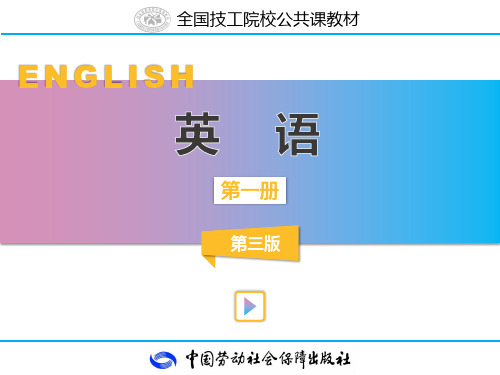
ENGLISH
第一册
第三版
CONTENTS Unit 1 Family Unit 2 Campus Unit 3 Friends Unit 4 Sports
Unit 5 Food Unit 6 Health Unit 7 Travel Unit 8 Plans
Unit 4 Sports
WARM-UP
TEXT
ORAL
WORD
COMMUNICATION SKILLS
SPECIAL DIFFICULTIES
STRUCTURE & GRAMMAR
healthy others ticket season Activity hunting fishing
New Words
/ˈhelθi/ /ˈʌðə(r)/ /ˈtɪkɪt/ /ˈsiːzn/ /ækˈtɪvəti/ /ˈhʌntɪŋ/ /ˈfɪʃɪŋ /
STRUCTURE & GRAMMAR
Arab Arabs Australia USA Canada
Proper Names
/ˈærəb/ /ˈærəbz/ / ɒ'streɪlɪə / /ˌjuː es ˈeɪ/ /'kænədə /
阿拉伯 阿拉伯人 澳大利亚 美国 加拿大
WARM-UP
TEXT
Sports change with the seasons. People play different games in summer and winter.
Swimming is fun in warm weather, but skating is good in winter.
Games and sports often grow out of people’s work and everyday activities. The Arabs use horses or camels in much of their everyday life. They use them in their sports, too.* It is the same with people in the northwest of China.
研究生英语综合教程UNIT4课文及翻译(含汉译英英译汉)
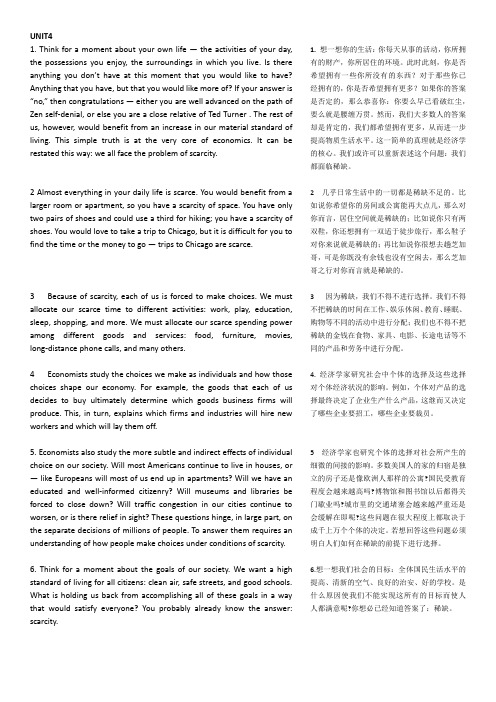
UNIT41. Think for a moment about your own life — the activities of your day, the possessions you enjoy, the surroundings in which you live. Is there anything you don’t have at this moment that you would like to have? Anything that you have, but that you would like more of? If your answer is “no,” then congratulations — either you are well advanced on the path of Zen self-denial, or else you are a close relative of Ted Turner . The rest of us, however, would benefit from an increase in our material standard of living. This simple truth is at the very core of economics. It can be restated this way: we all face the problem of scarcity.2 Almost everything in your daily life is scarce. You would benefit from a larger room or apartment, so you have a scarcity of space. You have only two pairs of shoes and could use a third for hiking; you have a scarcity of shoes. You would love to take a trip to Chicago, but it is difficult for you to find the time or the money to go — trips to Chicago are scarce.3 Because of scarcity, each of us is forced to make choices. We must allocate our scarce time to different activities: work, play, education, sleep, shopping, and more. We must allocate our scarce spending power among different goods and services: food, furniture, movies, long-distance phone calls, and many others.4 Economists study the choices we make as individuals and how those choices shape our economy. For example, the goods that each of us decides to buy ultimately determine which goods business firms will produce. This, in turn, explains which firms and industries will hire new workers and which will lay them off.5. Economists also study the more subtle and indirect effects of individual choice on our society. Will most Americans continue to live in houses, or — like Europeans will most of us end up in apartments? Will we have an educated and well-informed citizenry? Will museums and libraries be forced to close down? Will traffic congestion in our cities continue to worsen, or is there relief in sight? These questions hinge, in large part, on the separate decisions of millions of people. To answer them requires an understanding of how people make choices under conditions of scarcity.6. Think for a moment about the goals of our society. We want a high standard of living for all citizens: clean air, safe streets, and good schools. What is holding us back from accomplishing all of these goals in a way that would satisfy everyone? You probably already know the answer: scarcity. 1. 想一想你的生活:你每天从事的活动,你所拥有的财产,你所居住的环境。
- 1、下载文档前请自行甄别文档内容的完整性,平台不提供额外的编辑、内容补充、找答案等附加服务。
- 2、"仅部分预览"的文档,不可在线预览部分如存在完整性等问题,可反馈申请退款(可完整预览的文档不适用该条件!)。
- 3、如文档侵犯您的权益,请联系客服反馈,我们会尽快为您处理(人工客服工作时间:9:00-18:30)。
英雄 村,乡村 大学 在那个时候 害羞的 周围 变化 更多的 自信
• left——leave • didn’t——don’t • came——come • was——is • were——are • gave——give • taught——teach
• 1.Miss green is __gi_v_in_g__ us a lesson in the library.
她既热情又友好。 待在他身边很开心。 我们都爱她!
NO.4
• Now we have got lots of changes! • We’re becoming more confident!
现在我们有了许多的改变。
我们正变得更加自信。
hero village college at that time shy around changes more confident
• 2.The pupils are _t_e_lli_n_g__ stories about their heroes.
• 3.I am _w_ri_ti_ng___ a story about my hero.
writing——write giving——give telling ——tell
Open your books, please!
A young teacher hero
• 1、Miss Deng is a young teacher of a village school. 邓小姐是一位在乡村小学教书的年轻老师。
• 2、She left college two years ago, but she didn’t stay in the city.
她两年以前大学毕业,并没有留在城市里。 • 3、She came to a village school.
他去了一所乡村小学。
4、She teachers English. • 他教英语。 5、And she also teacher Chinese and music. • 她同时也教语文和音乐。
• Now we all like learning English.
• 她给我们上了第1节英语课。 • 她也教我们唱歌和跳舞。 • 我们现在都喜欢学习英语。
NO.3
• She is warm and kind. • It feels good to be around her. • We love her!
speak. • We couldn’s even speak putonghua.
• 邓小姐两年前来到这里。 • 她对我们很友好。 • 但那时候我们因为太害羞,以至于不敢开口。 •我们甚至不会说普通话。
NO.2
• She gave us the first English class.
• She taught us to sing and dancewhat her pupils said about their hero Miss Deng.
NO.1
• Miss Deng came here two years ago.
• She was very friendly to us. • But at that time we were too shy to
